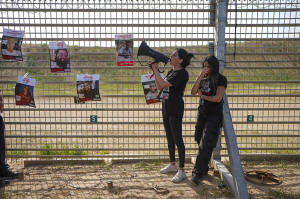Families of hostages in Gaza are terrified they won't return after
Israel resumes fighting
[March 19, 2025]
By SAM MEDNICK
TEL AVIV, Israel (AP) — When a ceasefire between Israel and Hamas began
two months ago, Herut Nimrodi knew it would take time before her son was
released from captivity in Gaza. The 20-year-old soldier was meant to be
part of the second phase of the deal winding down the war.
But with Israel's surprise bombardment of Gaza, she fears he might not
come home at all.
“I really wanted to believe that there is still a chance to reach a
second stage without renewing this war. But it feels like my building of
hope has collapsed, and I have no idea what to do next,” Nimrodi said
Tuesday.
Nearly 60 families have relatives still held in Gaza. About two dozen
hostages are believed to be alive.
During the ceasefire's first phase, which began in January, Hamas
released 25 Israeli hostages and the bodies of eight others in exchange
for nearly 2,000 Palestinian prisoners. But since that phase ended early
this month, the sides have not been able to agree on a way forward.
Israel's renewed airstrikes threaten to end the fragile deal.
Nimrodi's son, Tamir, was abducted from his army base when Hamas stormed
into Israel on Oct. 7, 2023, killing some 1,200 people and taking more
than 250 hostage. She's had no sign of life. He hasn't been declared
dead by Israel.
“It’s so sad that this is the only solution that they could find,” she
said, lamenting the government's decision.
The strikes early Tuesday killed more than 400 people and shattered a
relative calm — along with hopes of ending the war that has killed over
48,000 Palestinians.

Israeli Prime Minister Benjamin Netanyahu said he ordered the airstrikes
because of lack of progress in talks to extend the ceasefire. Officials
called the operation open-ended.
The return to fighting could deepen the painful debate in Israel over
the fate of the remaining hostages.
Netanyahu and his hardline governing partners believe renewing the war
will put pressure on Hamas to free them and move Israel closer to its
goal of destroying Hamas' military and governing capabilities.
But most hostage families, and large parts of the Israeli public,
believe such goals are unrealistic. They say time is running out,
particularly after the recent releases of emaciated-looking hostages who
later described harsh conditions in captivity.
Hamas accused Netanyahu of upending the ceasefire and exposing the
hostages ”to an unknown fate.”
Families of hostages called on supporters to protest with them outside
Israel’s parliament Tuesday.
[to top of second column]
|

Relatives of hostage held by Hamas in the Gaza Strip, stand by the
Israe-Gaza border fence, calling for their release and expressing
concerns that the resumption of fighting in Gaza puts their loved
ones at risk, in southern Israel, Tuesday, March 18, 2025. (AP
Photo/Ohad Zwigenberg)

Some families who already know their relatives in Gaza are dead
called the government’s decision unacceptable.
"This is not only a disaster in every way, shape or form on how the
hostages keep suffering, being chained to walls, starved, abused,
but also the death toll that keeps rising on the Gazan side,” Udi
Goren said.
His cousin Tal Haimi was killed on Oct. 7 and his body was taken
into Gaza. Goren said the international community must pressure
Hamas, Israel and the mediators — the United States, Egypt and Qatar
— to end the war.
“Returning to fighting? Did you listen to a word of what we, the
returnees released in the last deal, have been saying to you?"
former hostage Omer Wenkert wrote on Instagram.
Romi Gonen, among the first hostages to be freed in the ceasefire's
first phase, said she would never forget what it felt like in
captivity to hear the bombs after previous ceasefire talks collapsed
and realize she wouldn't be freed any time soon.
“I beg you, the people of Israel, we must continue to fight for
them," she said on Instagram.
Sylvia Cunio, whose two sons are held hostage, accused Israel's
leaders of not having a heart.
“It isn’t right to continue the fighting. I want my children back
home already. If he wants to kill me, the prime minister, let him do
that already because I won’t get through this,” she said on local
radio.
Nimrodi said she’s worried the airstrikes might not only harm her
son and the other hostages but also make their living conditions
worse.
The last time she saw Tamir, he was a funny teenager who rode horses
and loved learning about geology and astronomy, she said. The two
had a similar humor and used to talk about everything.
While she's terrified of what's to come, she said she won't stop
fighting to see him again.
“Please, keep strong, survive,” she said, addressing him. “So
there’s a chance for us to meet once more.”
___
Associated Press writer Natalie Melzer in Nahariya, Israel
contributed.
All contents © copyright 2025 Associated Press. All rights reserved |